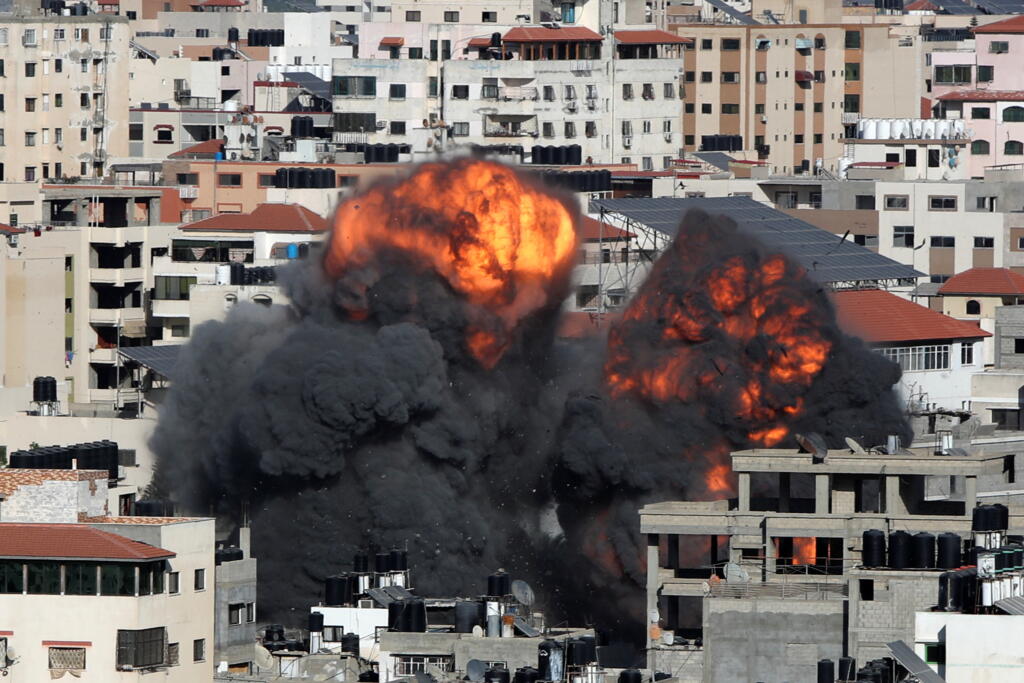Recently, at least 45 individuals, including children, were killed in a refugee camp in Gaza’s Rafah following an Israeli air strike: Reports says. This tragic event occurred just days after the International Court of Justice (ICJ) directed Israel to cease its operations in Rafah. The air strike has provoked widespread international outrage, further isolating Israel on the global stage due to its actions in Gaza. Israel initiated the strike on Rafah late Sunday, shortly after Hamas fired rockets at the Tel Aviv area, most of which were intercepted.
#AllEyesOnRafah
Despite the ICJ’s directive to halt operations in Rafah, Israeli forces have continued their offensive in this border town, which was previously considered a safe haven in Gaza. The hashtag #AllEyesOnRafah has gained significant traction on social media, serving as a rallying cry for raising awareness about the crisis in this Gaza city. Numerous celebrities have shared messages of support using this hashtag, drawing global attention to the plight of Palestinians affected by the conflict.
RAFAH
Historically, Rafah has been a crucial entry point for humanitarian aid. However, the recent intensification of Israeli military actions has resulted in the seizure of control over the crossing. The ongoing conflict in Rafah has displaced over a million Palestinians, many of whom had already been uprooted by the broader war between Israel and Hamas. The mobility of Palestinians within Gaza has been severely restricted, as they find themselves vulnerable to attacks wherever they move.
The United Nations has raised concerns about a potential famine, particularly in the northern regions of Gaza. The incursion into Rafah has heightened fears of malnutrition in the southern areas as well. While acknowledging reports of civilian casualties, the Israeli army indicated that the incident is under investigation.
The current conflict in Gaza was ignited by a Hamas attack on southern Israel on October 7, 2023, which resulted in the deaths of over 1,170 individuals, primarily civilians. In response, Israel’s retaliatory actions have also claimed many lives in Gaza.
The selective attention of celebrities, who prominently support the #AllEyesOnRafah campaign while remaining silent on initial Hamas aggressions, has drawn criticism. A balanced advocacy approach, recognizing the suffering on all sides, would contribute to a more comprehensive and authentic engagement with global humanitarian issues.
The Cool and Enlightened So called Celebrities
Several Indian celebrities have prominently highlighted the #AllEyesOnRafah campaign, drawing attention to the humanitarian crisis in Gaza. This surge of empathy, while commendable, has stirred controversy among many Indians. Critics point out that these same celebrities were notably silent during crucial moments of national strife, such as when Indian soldiers lost their lives in border clashes with Pakistan and China.
The criticism underscores a perceived selective activism, where global issues receive more celebrity attention than domestic tragedies. The Galwan Valley clash in 2020, where 20 Indian soldiers were martyred, and the numerous instances of cross-border terrorism originating from Pakistan, were moments of intense national pain and pride. Yet, the absence of significant celebrity commentary during these times has not gone unnoticed.
This disparity raises questions about the motivations behind such selective social media activism. Are celebrities influenced more by trending global issues than by patriotic sentiment? Or is there a hesitation to address politically sensitive domestic matters?
Is It a Propaganda
#AllEyesOnRafah: This social media trend has been significantly amplified by numerous celebrities, who have leveraged their platforms to highlight the plight of civilians caught in the crossfire. However, this wave of celebrity activism has not been without controversy.
These celebrities remained conspicuously silent when Hamas launched unprovoked attacks on Israel, causing significant casualties and destruction. This selective advocacy raises questions about the motivations behind their social media engagement. The silence during the initial aggressions, when Israeli civilians faced rocket fire and terror attacks, is seen by some as a double standard, undermining the perceived impartiality and comprehensiveness of their humanitarian concern.
Selective Activism
This disparity highlights a broader issue of selective activism, where global influencers may choose causes that align with popular sentiment or current trends, rather than addressing all sides of a conflict. By not condemning the initial acts of aggression by Hamas, these celebrities risk appearing biased, potentially diminishing the impact and credibility of their advocacy.
Conclusion
For true humanitarian advocacy to be effective, it needs to be consistent and balanced, acknowledging all facets of a conflict. Addressing violence and suffering on both sides can foster a more nuanced and comprehensive understanding, promoting genuine empathy and constructive dialogue.
